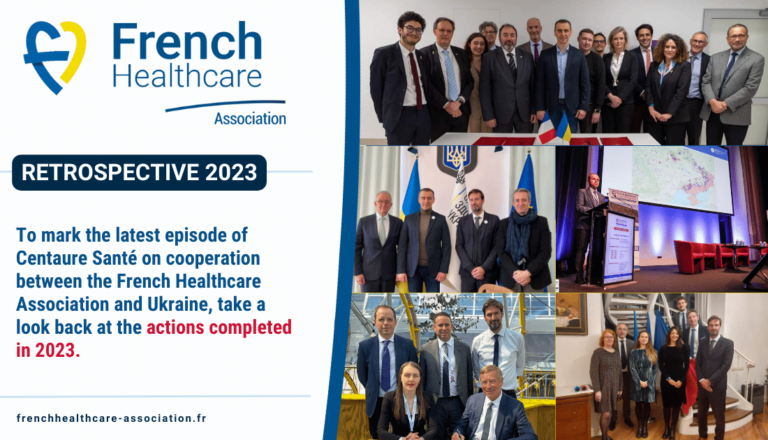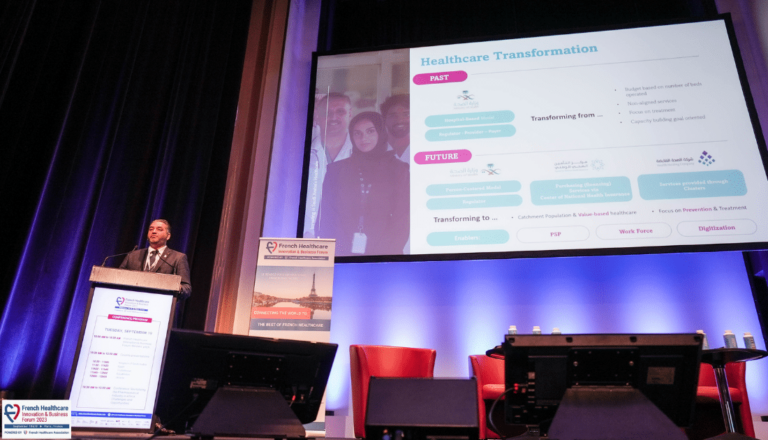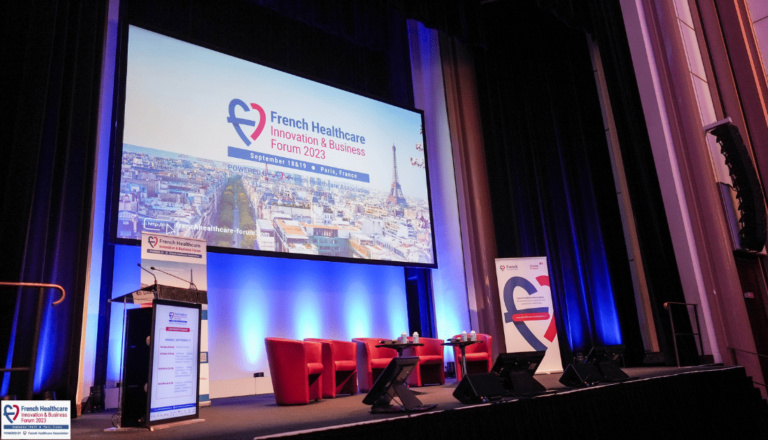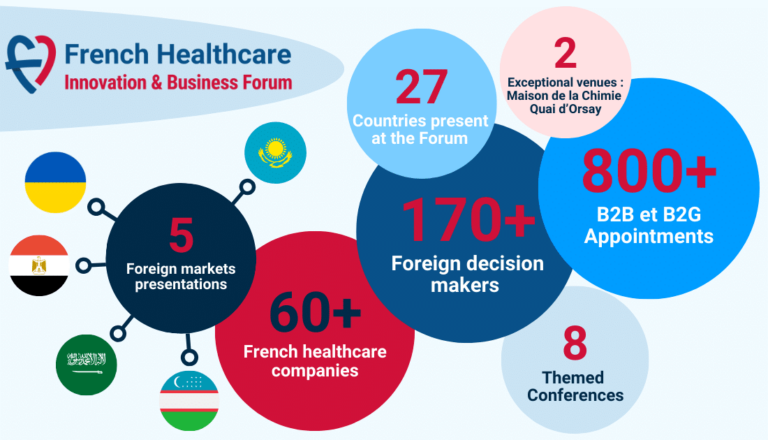Digital health
Cutting-edge research, a State serving as regulator and accelerator, high ethical standards and a buoyant ecosystem for therapeutic and organizational innovations. These are the pillars on which France’s e-health policy is founded. With artificial intelligence (AI) having swept into all areas of healthcare, the key challenges and issues are constantly changing. In a co-constructive approach, public and private stakeholders are increasingly working together to deliver tangible benefits to patients, users and healthcare professionals.
“Putting digital technology to work for health.” This is the principle threaded throughout the 2023-2027 Digital Healthcare Roadmap, presented by the Government in May 2023. There are great aspirations to make France a leader in innovation and attract talents in e-health, and building up a true digital health industry at the same time. “We are committed to this purpose with a firm collective resolve, in the service of our values and ethics, which form a “’third European way’ between the USA and China, capable of sparking the trust essential to the development of digital uses and improved health,” said François Braun, Minister for Health and Prevention, convinced that “progress achieved in e-health, in particular in telemedicine and telemonitoring, is truly an equalizing force in the field of healthcare, in particular for the more remote areas.” The structuring of an ecosystem devoted to research, care and innovation must be such that it addresses the challenges of population ageing, the increase in chronic diseases and access to healthcare. By 2030, healthcare will be resolutely digital, with medical care that is more predictive and preventive.
The digital technology revolution is already underway in a wide range of fields: namely, e-health with information systems, the Mon espace santé (1) digital health record or digital solutions for the care pathway; telehealth with remote consultations, remote monitoring, remote medicine, remote expertise, mobile applications and connected devices; AI image analysis and health data exploitation (big data and data mining) all made possible by interoperability.
The introduction of telemonitoring into common law, at the start of 2023, and the early financial coverage provided for digital medical devices are two key signals. These two decisions have made France the first European country to reimburse medical telemonitoring solutions that offer a clinical benefit or improve the organization of care. A further sign of the sector’s dynamism came with the impressive fundraising events held in the first quarter of 2023, for French startups, such as Iktos, that specializes in artificial intelligence dedicated to the discovery of effective new chemical molecules in the framework of drug research (€15.5 million), Inato that provides a platform for pharmaceutical groups and hospital centers, in order to facilitate the recruitment of patients for clinical trials (€12.6 million) or, for instance, Kiro that develops AI solutions to interpret biological analysis reports.
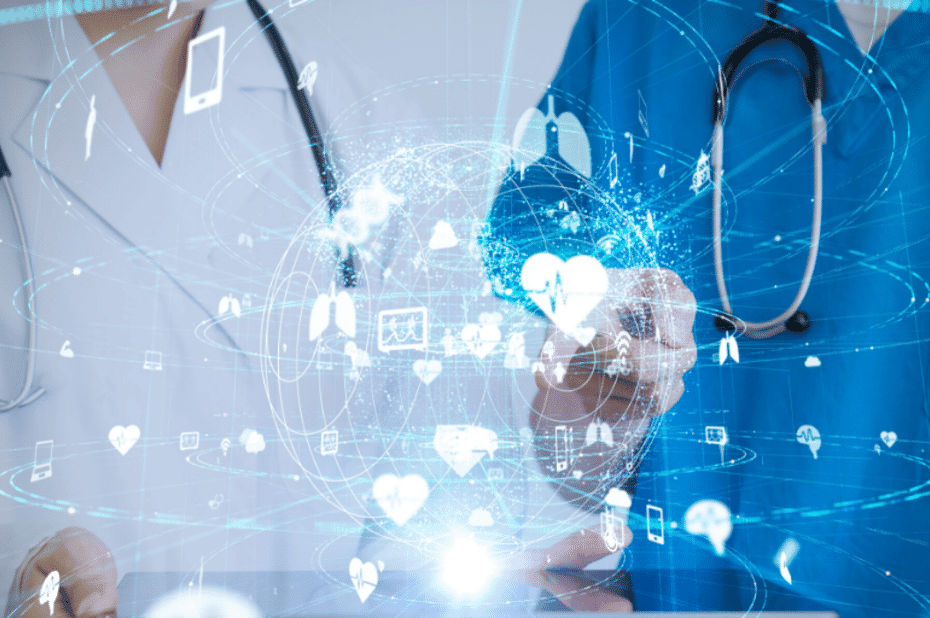
Solid State support and a national dynamic
“The financial resources being devoted to the deployment of digital healthcare and cybersecurity are substantial. There is a real and quite exemplary momentum in Europe, in terms of innovation and acceleration strategy,” emphasized Annie Prévot, Director of France’s eHealth Agency (ANS), a public interest grouping that establishes the framework, foundations and major e-health programs to speed up the digital transformation of the health system.
“The government has put more than €2 billion on the table for digital healthcare. There is real support from the public authorities to speed up the deployment of ‘Mon espace santé’. Today, the ambition is to ensure that all our innovations can reach patients and professionals alike, with major implications in terms of distribution and use. France boasts outstanding strengths, with its internationally recognized healthcare system, the breadth of its public and private hospital network, its network of independent professionals and its training programs,” said Jérôme Leleu, E-health expert, Founder & CEO of Interaction Healthcare and Simforhealth, a company specialized in digital health simulation, which is currently implementing a program of international expansion.
The creation of the Agency for Innovation in Healthcare (AIS) in late 2022 is one of the measures provided for in the 2030 Health Innovation Plan, the health-related component of France 2030, with the aim of facilitating and driving access to innovations in health care for patients and professionals.“This final objective guides our undertakings and our work – we steer and co-ordinate the huge investments set aside for it, €7.5 billion, with priorities identified in the areas of bioproduction and biodrugs, emerging infectious diseases and CBRN threats, digital health and innovative medical devices,” explained Lise Alter, General Director of the AIS. The support we offer to companies is tailored to the major challenges they face: access to markets, scaling up or off-label uses, when the healthcare system does not have a place for the solution. The AIS has in particular initiated a pilot plan on public procurement designed to introduce buyers to innovations and thus enable them to distribute them. It is expected to soon take up quarters on the PariSanté Campus.
This world-class training, research, innovation and entrepreneurship hub brings together five public operators on the 20,000 sq m facility south of Paris (Inserm, Université Paris Sciences & Lettres, Inria, Health Data Hub, Agence du Numérique en santé) and a very large number of private-sector partners in research, innovation and care. Over 1,300 players (including 80 startups, major private players from health industries and services) are already working together in this digital healthcare Silicon Valley that will be transferred to another site in 2028-2029: the former military teaching hospital in Val-de-Grâce. “In order to build up the synergies in the ecosystem, we have created thematic ties between startups, researchers, students, manufacturers and institutions around central topics such as imaging, artificial intelligence and interoperability. We are also initiating support programs, aimed at both scientific and entrepreneurial players” said Professor Antoine Tesnière, Director of PariSanté Campus. An initial program has been launched to develop prevention using digital tools, also supported by BPI France and benefiting from €100 million in funding.
On the research front, the emphasis is currently on bringing the various areas of expertise together. Officially launched in June 2023, the Digital Health Priority Research Program and Infrastructure (PEPR) is jointly backed by the Inserm and Inria. With a 7-year budget of €60 million, its aim is to position France as the European leader in digital health innovation. Two major areas of research have been chosen: gaining so-called “multi-scale” biological and medical data (i.e. in space, on scales ranging from DNA to population monitoring, for example, but also in time, ranging from a few milliseconds to several decades) for each patient and, based on the processing of such data, building the most comprehensive personalized and scalable digital representation possible of the said patient (digital twin).
Ownership and Ethics
From robotics-assisted surgical operations to digital twins of organs, smart prosthetics, remote monitoring of heart failure patients, digitized follow-up for cancer patients, implanted medical devices for diabetics and beyond… Artificial Intelligence (IA) and its algorithms are increasingly being used by healthcare professionals and stakeholders in the medico-social sector. However, the necessary trust remains to be built.
“One of the major challenges for digital health is ensuring that not only the professionals working in the health system, but also patients and users take ownership of the system,” said Dr. Jacques Lucas, former Chairman of the French eHealth Agency (ANS). With Mon espace santé, patients become empowered. They will have access to all their health reports, which will improve the quality and speed of care. However, a number of issues still need to be ironed out and much needs to be done to gain everybody’s trust, with clear, fair and appropriate information, truly involving all the players in the ecosystem. It is essential that patients be unidentifiable by anyone viewing their health profile..”
PariSanté Campus is also intent on involve citizens in the ethical debate on digital health, in France but, above all, across Europe. The right balance still needs to be struck, in order to establish frameworks without slowing down innovation transfer. “We cannot adopt a mindset that pits regulation against innovation. In other words, we need a framework that is agile and flexible enough, given the speed of innovation,” said Professor Tesnière.
Special attention is being paid to enabling human and collegial supervision of AI solutions. “Over time, healthcare professionals may need to use AI as an obligation of means, for example to refine a diagnosis. However, responsibility for that decision lies with the doctors or other professionals,” said Jacques Lucas, who points to the important role of France on these ethical topics. Ethik-IA a citizen and academic initiative aimed at securing human supervision of healthcare algorithms, championed the concept of Human Guarantee in the use of AI and digital health, which is now recognized in the draft European regulations on AI. In May 2023, it launched Europe’s first integrated digital healthcare offer with a human- guaranteed AI use, in partnership with Medin +, one of the leaders in teleradiology.
The cornerstone in the development of digital technology in healthcare, the ANS has published the Doctrine on Digital in Healthcare (4th edition in 2023). This reference framework for digital services and the exchange and sharing of health data is aimed at healthcare facilities, Regional Support Consortia for the Development of E-health (GRADeS), to publishers and to professionals in the healthcare or medico-social sectors. “We are also working on the issues of cybersecurity and interoperability of outpatient/hospital software in order to improve the quality of care and the sharing of healthcare data,” pointed out Annie Prévot, who is closely monitoring regulatory harmonization at the European level. From 2025 onwards, the ANS will have the power impose financial penalties on digital health companies that fail to adhere to the various standards published by the ANS. A soon-to-be published standard on teleconsultation will, for example, set out the rules on the confidentiality of exchanges between patients and their healthcare professionals. Software publishers must also provide any healthcare professional with the ability to block the sending of information to the Mon espace santé electronic health record.
A French sectors that shines across the world
“Making France the global leader in precision medicine based on digital pathology”. Such is the aim of Owkin, a biotech company that specializes in AI applied to medical research, which launched the French consortium PortrAIt, in collaboration with Gustave Roussy and Unicancer. With a budget of €33 million, financed by France 2030 and operated by Bpifrance and the European Union, PortrAlt aims to position France as leader in the use of AI applied to digital pathology. The tools created through this research platform will speed up the work of pathologists working to detect the presence of certain biomarkers or predict patient outcomes, in order to ultimately improve cancer management.
Most of the 25 award-winning businesses at FrenchTech 2030 working in the area of health, have deployed internationally. Here are just a few examples: Tree Frog, France’s fast-growing biotech market leader, wants to put cellular therapy in different therapeutic fields within reach of millions of patients, via its breakthrough technology, C-Stem. Implicity, which provides telemonitoring for almost 80,000 patients suffering from cardiovascular diseases in the USA and Europe, aims to become the global leader in preventive cardiology thanks to its R&D in artificial intelligence and data science. Lastly, , Tribun Health, a company that is designing digitized slide management software and transforming cancer diagnostics, targets primarily the USA and Scandinavian and UK markets. Virtual reality in the area of health is another buoyant market. HypnoVR, a leader in digital therapies aimed at reducing pain and anxiety, is for instance speeding up the commercial deployment of its medical hypnosis solution in France and throughout Europe. One of the great aspirations of ParisSanté Campus is to make the connected healthcare ecosystem shine internationally. In order to develop both its export and attractiveness, it first had to analyze the models used beyond its borders, in Europe, China and the USA. The second stage consisted of determining the key strategic issues internationally and creating operational strategies and cross-border collaborations, in Europe, North America, Israel, the Asia-Pacific zone and the Africa zone. “Our aim is to support startups that are interested in exporting to foreign markets and to host programs and foreign investments or foreign startups that are looking to come to France, with an anchoring point at the PariSanté Campus,” said Antoine Tesnière. At the 2023 BIO International Convention in Boston, he was able to showcase PariSanté Campus’ international approach thanks to the teams at Business France Santé and Business France North America. “Having centralized everything for our foreign contacts gives us with a high degree of visibility and clarity. There are few ecosystems that are as extensive, while also being located on a single site.” Europe is of course the first arena in which French excellence shines. A large number of events were hosted in France during the French Presidency of the European Union. PariSanté Campus has also instituted collaborative agreements with structures that support the dynamics of all the European Member States, in such a way as to form bilateral strategies. “We took part in an initial Franco-Swedish incubator, which has produced its first graduating class made up of startups from both countries,” said Antoine Tesnière. “We are in very advanced discussions with Germany on regulatory topics and are very regularly visited by different delegations from the Member States to outline avenues for collaboration.” All of this is taking place against a backdrop of digital sovereignty for which Europe is instituting ever more regulations, with a regulation on AI, one on health data and the implementation of pilot programs for health data warehouses. These past few years, France has been rising up through the ranks of innovative startups and foreign investments in Europe.
(1) which is intended to enable better health monitoring and personalized prevention for all

Four gems in French Healthtech
Dépist&vous to take the anxiety out of screening
“What if we were able to prevent one out of every two cases of cancer? ” That is what Dr. Charlotte Berthaut, intensive care anesthetist, founder and CEO of Dépist&vous, has set out to do, by putting digital technology to work for public health. “How can we reach more people to inform about the good habits they need build and the signs that should tip them off? The idea is to take action on modifiable risk factors, which account for two-thirds of premature deaths. We wanted to address a number of issues: lack of knowledge, lack of information and oversight,” said the winner of the “Health Personality of the Year” award at the BFM Business Health Check-Up Grands Prix 2023. Soon to be listed on Mon espace santé, the e-health platform makes it possible for users to plan their cancer screening in a personalized manner, by filling out a brief questionnaire. Dépist&vous offers educational resources, directories of healthcare professionals, appointment reminders and tailored advice. The platform is currently being marketed with insurers, supplementary health insurance providers and businesses, which will be able to offer this service to their members. “What we want to do is to take the anxiety out of screening by making it easier,” Charlotte Berthaut pointed out. “Ultimately, we would like to promote good proactive prevention practices among our users by rewarding them and giving them free access to applications in the fields of prevention, sport and well-being.”
Planning surgery with 3D simulation thanks to Visible Patient
Winner of the Check Up Santé 2023 Grand Prize for e-Health Project of the Year, Visible Patient models organs and pathological structures in 3D so that surgeons can operate more easily and effectively.
The project has been maturing for over two decades. After completing a thesis on 3D modeling of patients based on cross-sectional medical images, Professor Luc Soler, who was recruited by the IRCAD (the French Institute for Research on Digestive Cancers), proposed the Medica project in 1999, “which was exactly Visible Patient, i.e. an online image analysis laboratory.” “Our aspiration at the time was to model the whole of the human body and not just the liver,” he explained. Incorporated into the European Passport project, it was awarded the “European Success Story” label and gave rise to three startups including Visible Patient, founded in 2013. In 2019, the company raised over €13 million and in 2020, signed an exclusive partnership agreement with Johnson & Johnson for the distribution of its products.
“100% coverage by health insurance companies and mutual insurers is one of the differentiating factors we have established. Because Visible Patient is paid for at the source, there’s a fixed price, which means users know how many patients they’re going to have for a given amount of money”, explained Luc Soler, who also sees in this the benefit of reducing fraud risk. 58% of the French population is currently covered by mutual insurance partners and insurers.
A turning point for surgeons
Concretely, the doctor sends the medical image obtained from a scanner or an MRI to a secure server. The online image analysis laboratory turns it into a 3D duplicate of the organs (lungs, liver, kidneys, colon, pancreas, adrenal glands, parathyroids, vascular anomalies), which the doctor can then access using a medical device. This 3D reconstruction makes it possible for surgeons to highlight anatomical variations, receive an accurate estimate of the devascularized volumes, carry out a risk-free simulation of the planned procedure before the operation, and access the 3D simulation during the procedure with the help of a virtual reality headset. For doctors, this is a revolution. “We can’t do without it anymore, , because the ease it creates helps us with our strategy for every operation,” said Professor Jacques Marescaux, from the Department of Digestive and Endocrine Surgery at the Strasbourg NHC. There are also benefits for research, as 80% of patients give consent for their (anonymized) data to be reused “The most important thing with AI is having human supervision — otherwise, we lose our fundamental freedom. We implement dual human control, by radiology technicians who analyze every image. The first radiographer’s results are always checked by a second operator,” Luc Soler specified. A project has been launched in recent months aimed at endometriosis, to enable more targeted and more effective operations. The clinical studies are under way. Visible Patient, which is certified in 30 countries, is available for most digestive, thoracic, urological and pediatric surgeries. Over 50% of contracts now signed are internationally.
Speeding up diagnosis with Rofim
Rofim, a telemedicine company formed in 2018, rests on three pillars: tele-expertise, teleconsultation and Multidisciplinary Consultation Meetings (MCM). In recent months, Rofim has become a purpose-driven company, its aim being to have the greatest possible impact on reducing diagnosis time, by facilitating referrals between practitioners. “”Impact was central to my decision to launch my own business and has been a driving force in my day-to-day work since the very start of our operations. It is this commitment that we wanted to have recognized via the purpose-driven company commitment, as an organization that endeavors to improve patients’ quality of life,” said Emilie Mercadal, CEO and Co-founder along with Dr. David Bensoussan, Vascular Surgeon.
The primary aim of Rofim was to provide a solution for doctors who need to be able to share images in order to receive an outside opinion. A few months after the start-up was created, tele-expertise became established in common law, in particular to relieve overcrowding in hospital departments and curb the need for patients to be transported for further advice.
“”This gave us confidence in our vision, and the rare disease networks, which have experts scattered all over France, quickly came to us to enjoy easier communication”. In addition to the tele-expertise module, a MCM module was then created to bring together up to 250 professionals. A teleconsultation module was also set up.
Accessible via mobile phone and the web, the platform is available to doctors free of charge when they register, enabling them to search for the most appropriate professional to answer their questions as soon as they have a case to submit. The subscription fee is paid by the hospitals (depending on the number of modules chosen and the number of doctors). The 743 hospitals currently using this solution are seeing the benefits, as it raises the profile of their institutions and leads to more patient referrals.
Collective Thinking – algorithms to save lives
Collective Thinking, a company specialized in artificial intelligence, centralizes and analyzes health data to improve patient monitoring and clinical research. “Healthcare is a world in which technologies can set off major changes. Algorithms are saving lives,” said Vincent Susplugas, winner of the Therapeutic Breakthrough of the Year Award, at the Health Check-Up Grand Prix 2023.
Collective Thinking provides a response to a number of challenges. The first is improving the quality of clinical research, using artificial intelligence to analyze data from tens of thousands of patients instead of just a few hundred. One research project is thus dedicated to following up on head injuries, and another to lung cancer, in conjunction with the Centres de lutte contre le cancer (Comprehensive Cancer Centers). “The other challenges relate to moving faster, at a lower cost,” said the company’s CEO, who specified that Collective Thinking AI is currently deployed in the IT centers of around 100 hospital facilities. “We are in possession of a huge array of data: operating reports, imaging reports, nurses’ forwarded reports, biological data, etc. AI has good reading comprehension ability and is capable of cross-referencing these with structured data,” said Vincent Susplugas. “Currently, answering a scientific question from a laboratory that is developing new treatments, is extremely expensive, costing several million euros. The aim, with our AI solutions, will clearly be to bring that down below €1 million, and thereby speed up therapeutic breakthroughs.” The company is also involved in medical coding, i.e., the ability to identify the procedures performed on patients for all their pathologies, and from this knowledge, to generate structured data. These data are fed into the national healthcare data system, which enables research, the development of medical strategies for hospital facilities and hospital financing. The fast-growing company, which has not yet engaged in any fund-raising, is expanding internationally, primarily in Switzerland and Germany.


